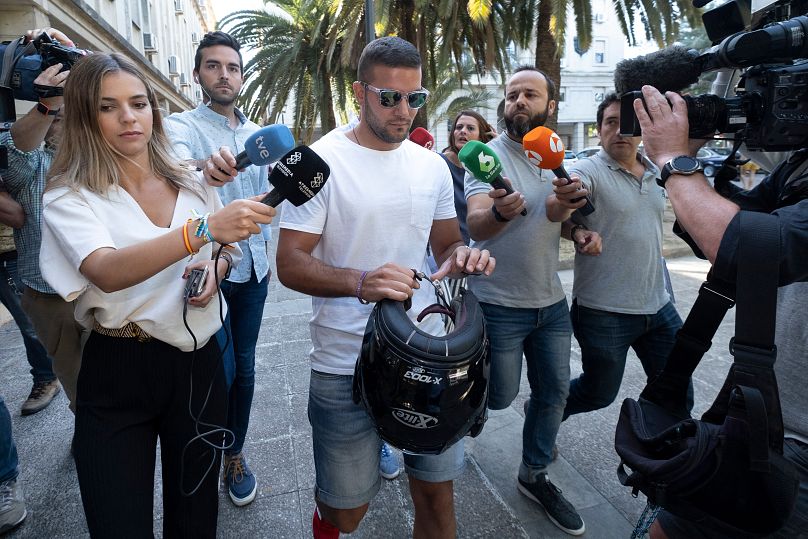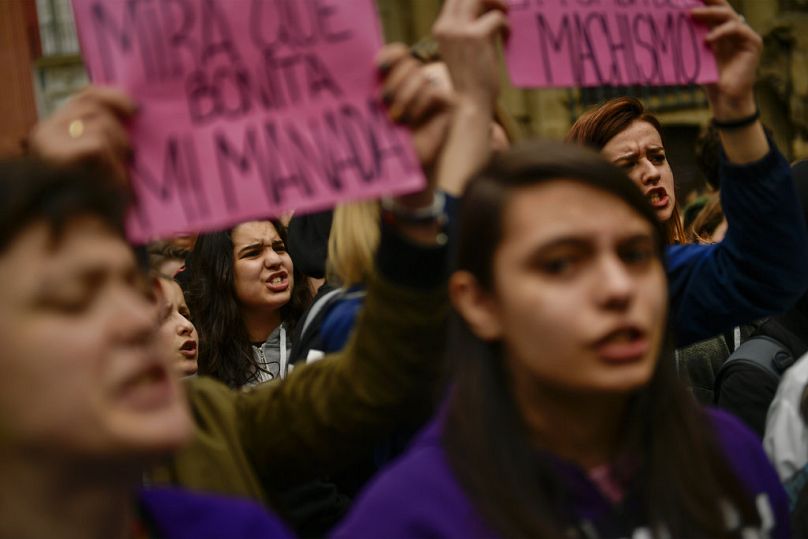He has benefited from a controversial new 'only yes means yes' rape law.
Ángel Boza, one of the five men convicted in the landmark 'Wolf Pack' gang rape case that angered Spain, has had his sentence reduced by one year - from 15 to 14 years - a top regional court in Navarra announced today.
 ADVERTISEMENT
ADVERTISEMENT
 ADVERTISEMENT
ADVERTISEMENT
Boza's jail term was reduced due to a loophole in the controversial 'only yes means yes' rape law.
The new legislation was introduced by the Ministry of Equality last November in a bid to toughen up penalties for sexual crimes, but it has allowed some convicted offenders to reduce their sentences.
It was in force for six months until the Spanish government imposed an urgent amendment to close this loophole.
Some 1,100 sex offenders had their sentences reduced during this time, including 115 people who were released from prison because their sentences were brought forward.
Boza's lawyer worked on an appeal to reduce his sentence while the law was still in force, which the court ruled on this Tuesday.
The legislation was drawn up after the 2016 'Wolf Pack' when Boza and four other men raped an 18-year-old woman during the Sanfermines, Pamplona's most popular bull-running festival.
The case prompted demonstrations across Spain as they were at first handed lesser sentences for sexual abuse, rather than rape, leading the Ministry of Equality to change the law.
Yet, Boza himself has benefited from the new legislation that was drafted in the wake of the public outcry.
He was the only one of the five "Wolf Pack" members who could appeal.
An ‘absolutely absurd’ law
Irene Montero, Spain's acting Minister of Equality, promoted the law, but has since faced fierce criticism from opposition parties, civil society, legal organisations and even her political allies for its failings.
In a recent televised interview, Spanish Prime Minister Pedro Sánchez claimed it was the biggest mistake his government made.
The new law was meant to be stricter than its predecessor. But experts say controversy surrounds its removal of the distinction between sexual abuse and sexual aggression, while cutting minimum and maximum jail sentences.
"This new law was made to give more importance to the role of consent. So, regardless of whether violence or intimidation is used or not, all behaviour that is not consensual must be condemned in the same way," José Luis Díez Ripollés, professor of Criminal Law at the University of Málaga, told Euronews.
"By putting assault and abuse together in the same offence, they tried to find a middle ground for the penalties."
"As they could not use the penal framework for assaults because it was too harsh for sexual abuse and they could not use the one for sexual abuse because it was too light for assaults, they decided to put the maximum limit for assaults with the minimum for abuse," he said.
Though Boza had already been tried, Spain's Criminal Code establishes a principle that allows new criminal laws to be retroactively applied - only if doing so benefits the defendant.
When the Supreme Court tried him in 2019, it imposed a sentence of 15 years' imprisonment. This sentence was in proximity to the legal minimum established at the time.
In an interview with Canal Sur radio, Boza's lawyer said it was "perfectly possible" for his sentence to be reduced.
"The minimum sentences have been reduced and the one handed down at the time by the Supreme Court specifically referred to applying the minimum penalty (to Boza). With that minimum having been modified, I understand that the application of the current norm is more favourable."
The "only yes is yes" law reduced the legal minimum sentence from 14 to 13 years, so the court considered it appropriate to reduce Boza's time behind bars.
In the same interview, Boza's lawyer said that what the new “only yes is yes” law had achieved was "absolutely absurd".
Experts told Euronews the change was “a mistake”.
“The old law was very well drafted. But this was an ideological reform in which they did not take into account how the Criminal Code works," said the professor of Criminal Law at the University of Málaga.












